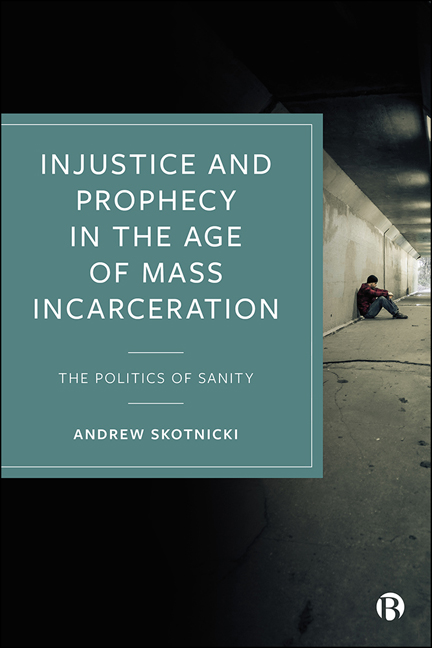4 - A Profile of the “Mad” Prophet
Published online by Cambridge University Press: 12 October 2022
Summary
We have thus far outlined how those purported to be mentally ill have been treated both historically and in current affairs. During that investigation, we identified the economic, social, philosophical, and theological sea change that turned the tide of opinion from one of awe, fear, or at least reticence before what appeared to be otherworldly forces, to one of, at best, suspicion, and, much more commonly, a desire to ban from public view the bearers of abnormal conduct. The population remanded to workhouses or asylums in former times, and to jails and prisons now, are inevitably those incidental or perceived as a threat to production, commerce, and bourgeois propriety. Their racial and economic features shape the determinative diagnostic categories that separate their troubling mannerisms from, as we saw in the last chapter, the anxiety and neurotic pitfalls of the materially comfortable in a world of endless possibility.
It is now our task to probe more deeply the contours of the prophetic personality in its unconventional and disturbing guise. We will highlight some of the distinguishing characteristics of these chosen emissaries, linking them, as we have done throughout this study, with the grammar used to categorize those thought to be intellectually handicapped. This will set the stage for a presentation on common sense and insight. The latter is the sine qua non of prophecy in each of its historical manifestations since it always exists in a fractious relationship with what is commonly held to be true.
The personality of the prophets
They announce a message no one wants to hear
The prophets who fill the cellblocks and tiers, the disciplinary and “special housing units” of detention centres in America, Great Britain, and beyond, are there, primarily, because they, like the notable “literary” prophets of the Hebrew Scriptures, convey a message that the majority of people simply are loathe to hear. Theirs is, by definition, a “language of newness” and, from Walter Brueggemann's perspective, it is the intent “of every totalitarian effort” to aggressively banish that language. Recall St. Stephen's words to those intent on his death: “You stiff-necked people … you are forever opposing the Holy Spirit, just as your ancestors used to do. Which of the prophets did [they] not persecute?” (Acts 7:51– 52
- Type
- Chapter
- Information
- Injustice and Prophecy in the Age of Mass IncarcerationThe Politics of Sanity, pp. 92 - 120Publisher: Bristol University PressPrint publication year: 2022

